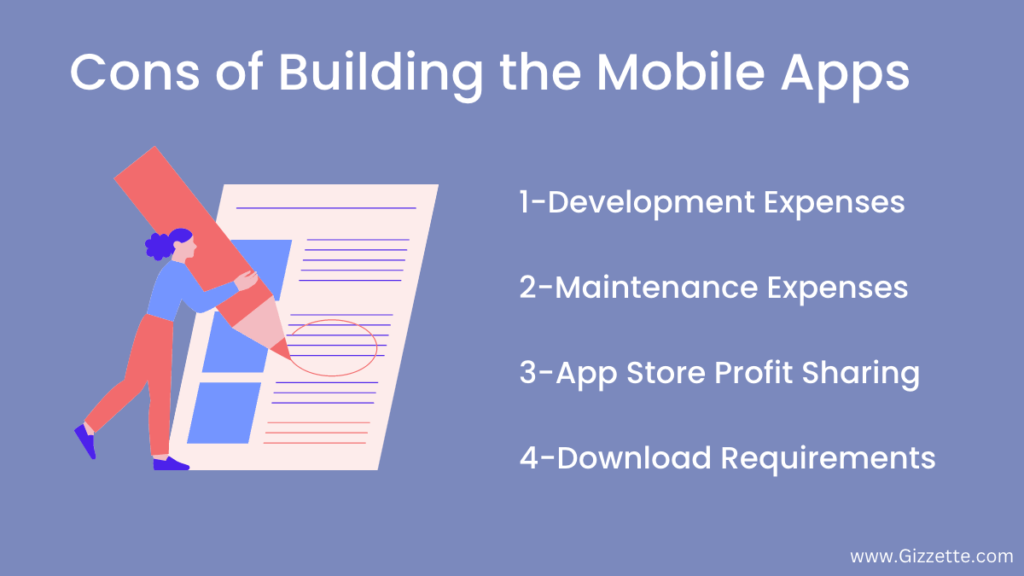What’s better, a mobile app or a web app? This is not necessarily a black-and-white scenario. You can get passionate responses on both sides if you poll startup founders. The variation is due to the fact that the correct response will vary based on the specifics of your company and app.
However, if you want to attract new customers and keep the ones you have happy, having a quality mobile app is a must. There are now more than 7 billion people in the world who own smartphones, making the mobile market an essential entry point for businesses. There are pros and cons to this approach that must be weighed before you commit to a plan to reach out to this demographic.
Developing a Web App vs. a Mobile App: Things to Consider
There are four main things you should think about when making your choice based on your current and future business plans. Think about the following questions:
- If there is an app, what functions will it have?
- How much does speed matter?
- What’s your project budget?
- Who is our target audience? online, offline, or both.
If you’ve already thought about and answered these questions, the pros, and cons listed below may help you make up your mind.
Mobile app development vs. web app development:
| Mobile App | Web App | |
| Definition Development cost |
A mobile app is a type of software developed exclusively for use on mobile devices. Expensive development |
A web app, on the other hand, is a piece of software that can be viewed through any browser, but it was constructed from scratch rather than with a no-code website builder. Low-cost development |
| Functionalies | More functionalities. Working requires location, SMS, a camera, and more permissions. | Fewer functionalities. Location permission is required only. |
| Tech-stacks | Different tech stacks are used based on Native, Hybrid, and cross-platform apps. | Different tech stacks are used like MEAN, MERN, MEVN, LAMP etc. |
There are a few more types of apps that fall under the mobile app development umbrella.
There are a variety of app types out there, including native ones, progressive web apps, hybrid apps, and responsive apps. It’s important to note that some of these apps are platform-dependent, while others are not. These software applications are selected by businesses based on their specific needs.
Read more here if you want to find out about the latest software development trends that could help make mobile and web apps better.
Let’s get into the benefits and downsides of creating mobile and web apps.
Pros and cons of building the mobile app
In order to take full advantage of the capabilities of the mobile device, mobile apps might be tailored to work with a specific OS. The development of mobile apps in cross-platform languages like React and Flutter is on the rise since it makes it possible to support both iOS and Android from a single codebase. But the cost to create a mobile app is typically higher than that of a web app. What you need to know is listed below.
Pros of mobile app development

1-Fast speed and high performance
It’s very frustrating when a mobile app freezes or takes too long to load. Most likely, you will stop using it. That’s why speed matters!
Apps that are made for mobile devices tend to run faster because they use the phone’s built-in features, like the microphone, camera, and location services. (There are, of course, exceptions that depend on the nature of the app’s functioning.)
When apps are allowed to use these built-in features, it makes them work better together. To give an example, it is much easier to take a picture in an app than on a laptop and then upload it to a web app. Mobile apps also feature consistent, high-speed performance because they are housed in local databases.
2-Targeted marketing and advertisement
If you don’t take advantage of marketing opportunities, it’s like neglecting your paycheck. Certainly, you won’t allow a single chance to slip through your fingers.
Making money off of an app is possible in numerous ways. In fact, having a variety of choices allows you to pick the one that works best for your app. One of the main benefits of mobile apps is the variety of ways they can be monetized.
Mobile apps are perfect for advertising on the go. Also, you can reach out to potential customers no matter where they are. In addition, the app’s user base provides a wealth of information that may be mined for insights that can inform future efforts at lead segmentation. Plus, apps are intuitive, so you can start using them right away with little to no training.
3-Offline Availability
Once downloaded, many mobile apps can be used without an Internet connection. That’s the most important aspect of a satisfying user experience.
An advantage of using a mobile app for a software system is that users can enter and save information even when they don’t have access to the internet or a mobile connection.
The possibility to save user data without an internet connection is a challenging part of mobile app development, but reputable software development firms can deliver that in the best way.
4-Increase your Audience
Nowadays, a mobile app is necessary for nearly any business.
Many consumers would rather use a mobile app than a website. Customers appreciate the speed and ease with which they can use apps to do things like book flights, make purchases, and even get coffee delivered straight to their door.
5-Possibility of Reengaging consumers
Mobile apps can send alerts via push notifications when the user performs predefined actions. For example, if a user hasn’t checked in or used the app in a while, you can remind them to do so by sending them a notification.
When combined with the fact that the app icon is always on the home screen of the mobile device, these small nudges may get people to use your company’s mobile app again after they stopped logging in or using it.
How precious!
Cons of mobile app development

Just as there are benefits and drawbacks to everything in our world. The same can be said for mobile apps, which also have their share of drawbacks.
1-Development Expenses
An app’s price tag is higher than that of a web app.
Since apps are still in their infancy, there aren’t many low-cost app development tools available to the general public just yet. In order to deliver services like chat and payment processing, most apps still need specialized programming and interfaces with other services. Even the most basic, the custom-coded app would still set you back $30,000–$40,000.
It’s kind of pricey. On top of all that, a top-notch professional software development business would charge you a fortune if you needed more features.
2-Maintenance Expenses
Mobile apps need to be updated often so that bugs can be fixed, security can be improved, and so on. There are more changes needed to keep the code clean for a mobile app than for a web app, even though cross-platform languages have made bug fixes faster.
That’s why it says, beware of small expenses,” because a large ship can be destroyed by even the smallest of leaks.
3-App Store Profit Sharing
It’s not cheap to get your app listed in the App Store. Apple takes 15% of your app’s gross revenue from in-app purchases up to a million dollars and charges you $99 each year to sell your mobile app in their app store. Once this happens, the commission rate increases to 30%.
In the same way, putting an app on the Google Play store is a lot like what Apple does, except that there is a one-time $25 fee and a commission structure that is the same as Apple’s.
4-Download Requirement
Both the Google Play Store and the Apple App Store boast millions upon millions of apps. Since app stores are made to give good organic search results, it’s likely that your app won’t be the one that your target users find.
After learning the pros and cons of mobile app development, we’ll move on to web app development so you can make better business decisions.
Pros and cons of web app development
Web apps are mobile-friendly websites that can also be used on desktop browsers. Web applications can be made to work best on a wide range of screens, from desktop computers to mobile phones and tablets. Because they only require access to a web browser, web apps are cross-platform, fast, and cheap.
So, let’s delve further into the web app to bring you even more knowledge.
Pros of web app Development

1-Ease of access
The more accessible the app is, the more growth and traffic it generates. As far as technology goes, that’s the direction things are heading.
With a web app, you can use any browser on any device, no matter what operating system it is running. This could lead to a larger user base as the word spreads.
2-Affordability of Maintenance
Because all of the code is shared, updating is a breeze when it gets a refresh. Also, developers can instantly submit updates to the server so that they show up on all devices right away. Likewise, updates to the web server seldom break web apps, but they can swiftly break a mobile OS.
3-Enhancing visibility on search engines
To make it easier for users to locate them, web apps are typically featured in search engine results (like Google). Most users use a search engine to look for information. Terms like “best organization software” are examples of such searches. If your web app is optimized for these keywords, users are more likely to find it in a search result than they are with a mobile app. Also, unlike in the app stores, there are more ways to actively improve a web app’s ranking in search results.
4-low development cost
Web apps have lower development costs than mobile apps since they take less time to build. This is mainly because there is only one version of a responsive web app that needs to be developed to support all platforms and operating systems.
5-No download Requirement
A web application gives its users the freedom to enter and leave the application at will. Even if it’s not too much of a hassle to get a mobile app, users have to put in a little more effort to do so. Because a web app doesn’t need to be downloaded to access it, this encourages more interested users to explore it.
However, it remains competitive in a world where the majority of online decisions are made in under 2 seconds.
Cons of Web App Development

1-Lesser Device-Function Integration
Web apps have restricted access to the camera and location services of a mobile device. Further, these apps have limited access to functionality unique to a given OS because they are not native to that OS.
2-No offline access
Web apps require access to the Internet in order to function, so they can’t be used if the user doesn’t have that. If the user runs out of data or is in an area with poor to no service, the web app cannot be used to view or enter critical information.
3-low security system
When compared to the strict requirements placed on mobile apps in order to be included in app stores, there is no such thing as a testing and approval procedure for web apps. This means there’s a chance that the existence of insecure online apps could put your data at risk.
Conclusion
Take a look at how you answered the five main questions. These answers will give you ideas about which way you should go.
- If your app will have features that need to use the native functions of the mobile device, a mobile app is probably the best choice.
- If speed is vital and your app’s features would work faster on a native mobile app, you may want to go with that option.
- If you don’t have much money, you might want to start as a web app.
- If it makes more sense for people to find your platform through keywords in a search browser, then you need a web app. If you want to reach more people, a mobile app could be the way to do it.
- If your users need to use the app when they don’t have internet access, a mobile app is probably the best choice.
In a nutshell, businesses begin with a web app before expanding into mobile app development. It’s possible you’ll decide to follow in their footsteps. Whatever your decision may be after reading this insightful blog, please share it with us in the comment section below.







Leave a Comment